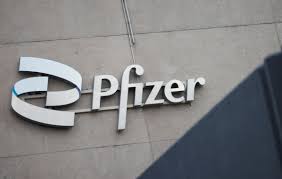
Pfizer raised its annual profit forecast on Tuesday, buoyed by its $43 billion acquisition of Seagen and strong sales of its heart disease and cancer treatments, despite facing a significant revenue decline from COVID-related products.
The company’s focus has shifted away from its COVID-19 vaccine and treatment, which have seen a substantial reduction in market demand, resulting in billions of dollars lost annually. In response, Pfizer CEO Albert Bourla has pursued strategic acquisitions, such as the Seagen deal, and implemented cost-cutting measures to streamline operations. The company is now concentrating on expanding its portfolio of cancer therapies.
Despite these efforts, Pfizer’s stock has struggled, trading at about half its pandemic-era highs as investors have retreated following the decline in COVID concerns. J.P. Morgan analyst Chris Schott noted that Pfizer’s stock may continue to underperform due to limited revenue growth and increased competition from rivals. Schott emphasized that significant improvements in new product launches or advancements in the pipeline would be needed to alter this trajectory.
In early trading, Pfizer’s shares were up about 1% to $31.05. The company reported a 3% increase in quarterly sales, reaching $13.3 billion, marking its first sales growth since the peak of COVID revenue in late 2022. This uptick was driven by strong performances from its heart disease drug Vyndaqel (or Vyndamax) and cancer treatment Padcev.
Pfizer has revised its annual profit outlook to $2.45 to $2.65 per share, up from its previous estimate of $2.15 to $2.35 per share. BMO Capital Markets analyst Evan Seigerman acknowledged that the increased forecast was anticipated given Pfizer’s historically conservative projections, but expressed optimism about the company's execution in key areas.
Additionally, Pfizer raised its full-year sales forecast for Paxlovid, its antiviral treatment for high-risk COVID cases, by $500 million to $3.5 billion. Sales of Vyndaqel exceeded analyst expectations, reaching $1.32 billion for the quarter, while Padcev sales totaled $394 million, surpassing estimates.
Sales of the COVID vaccine, developed in partnership with BioNTech, were $195 million for the quarter, while Paxlovid sales amounted to $251 million. These figures were slightly above analysts’ expectations for both products.
(Source:www.businesstimes.com.sg)
The company’s focus has shifted away from its COVID-19 vaccine and treatment, which have seen a substantial reduction in market demand, resulting in billions of dollars lost annually. In response, Pfizer CEO Albert Bourla has pursued strategic acquisitions, such as the Seagen deal, and implemented cost-cutting measures to streamline operations. The company is now concentrating on expanding its portfolio of cancer therapies.
Despite these efforts, Pfizer’s stock has struggled, trading at about half its pandemic-era highs as investors have retreated following the decline in COVID concerns. J.P. Morgan analyst Chris Schott noted that Pfizer’s stock may continue to underperform due to limited revenue growth and increased competition from rivals. Schott emphasized that significant improvements in new product launches or advancements in the pipeline would be needed to alter this trajectory.
In early trading, Pfizer’s shares were up about 1% to $31.05. The company reported a 3% increase in quarterly sales, reaching $13.3 billion, marking its first sales growth since the peak of COVID revenue in late 2022. This uptick was driven by strong performances from its heart disease drug Vyndaqel (or Vyndamax) and cancer treatment Padcev.
Pfizer has revised its annual profit outlook to $2.45 to $2.65 per share, up from its previous estimate of $2.15 to $2.35 per share. BMO Capital Markets analyst Evan Seigerman acknowledged that the increased forecast was anticipated given Pfizer’s historically conservative projections, but expressed optimism about the company's execution in key areas.
Additionally, Pfizer raised its full-year sales forecast for Paxlovid, its antiviral treatment for high-risk COVID cases, by $500 million to $3.5 billion. Sales of Vyndaqel exceeded analyst expectations, reaching $1.32 billion for the quarter, while Padcev sales totaled $394 million, surpassing estimates.
Sales of the COVID vaccine, developed in partnership with BioNTech, were $195 million for the quarter, while Paxlovid sales amounted to $251 million. These figures were slightly above analysts’ expectations for both products.
(Source:www.businesstimes.com.sg)














